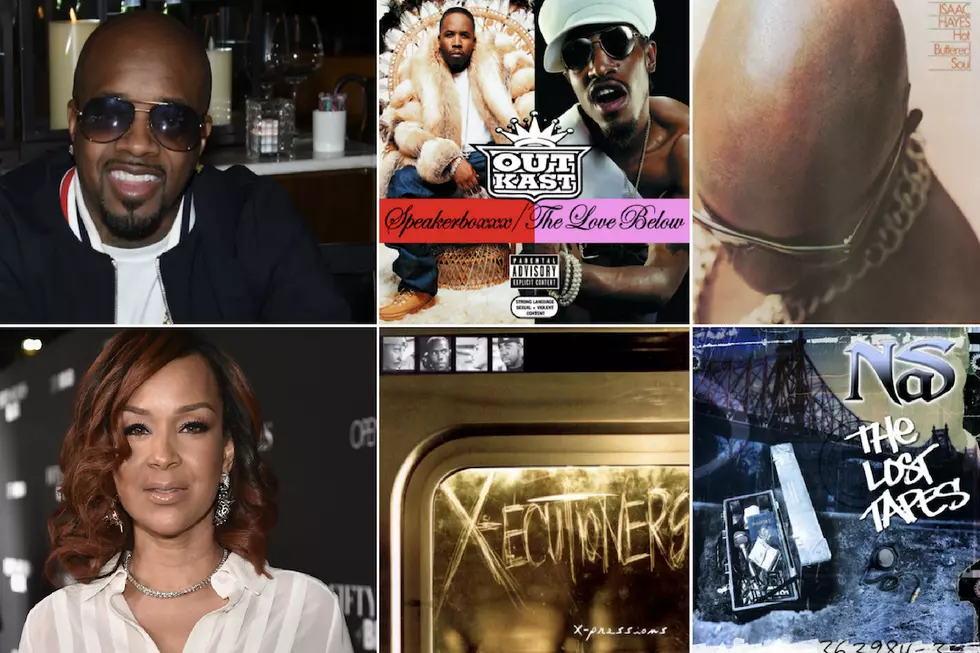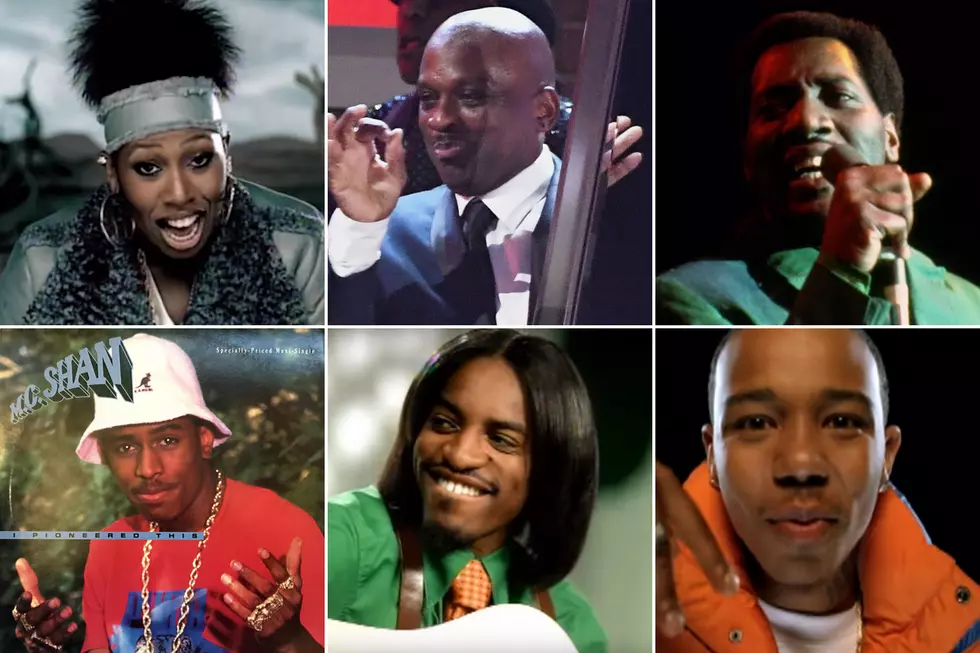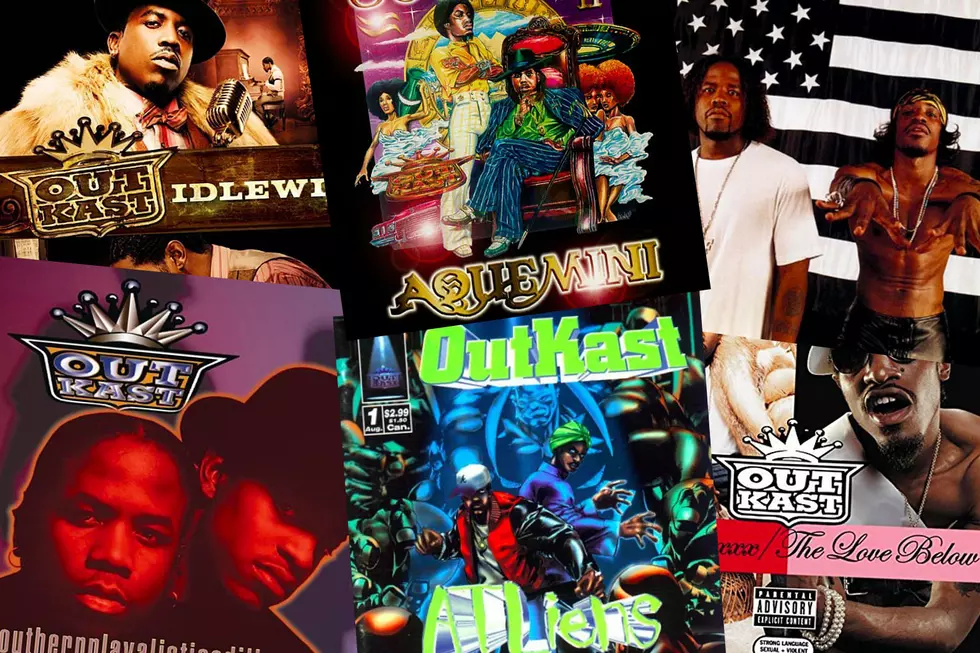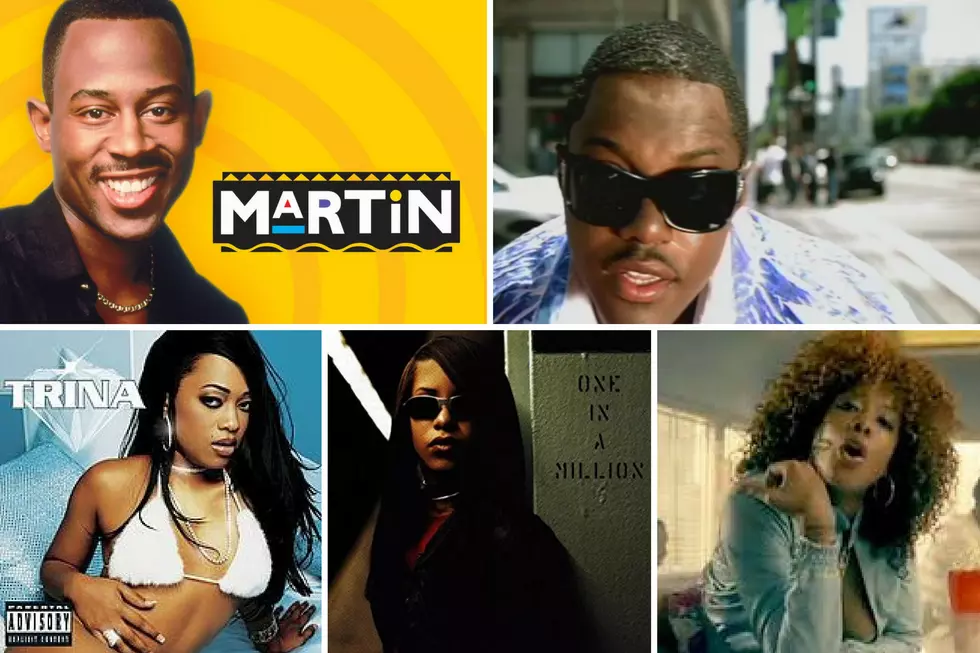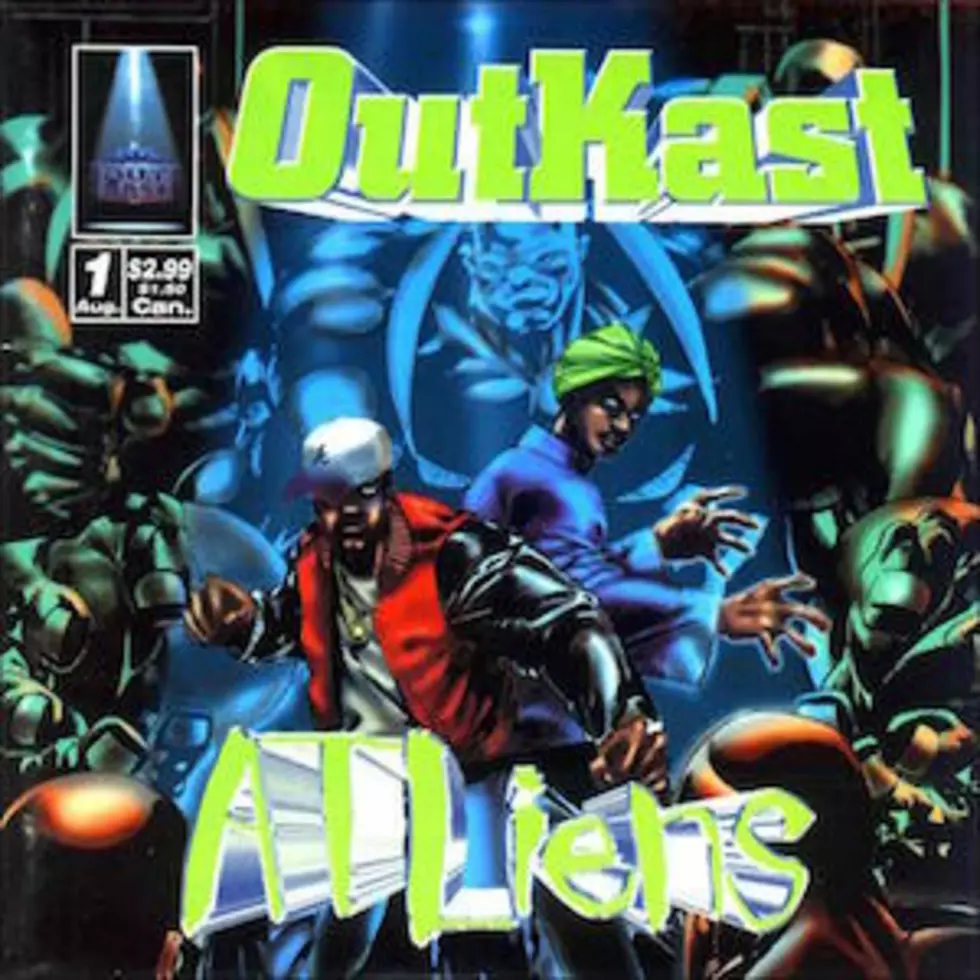
‘ATLiens’ Turns 20: OutKast Reinvented Themselves as Hip-Hop’s Boldest Visionaries
"Thinkin' about the second album. At the Dungeon, shootin' pool..."
OutKast's second album startled some fans when it was released in August 1996. Andre (not yet 3000) and Big Boi had debuted two years earlier as two thoughtful Atlanta teenagers, informed by the ideology of pimps 'n playas and the politics of street sages. The duo was clearly gifted lyrically, possessed of a unique perspective and, with the soulful productions of Organized Noize, a unique sound. In hindsight, the ballerific pimp image they'd presented on their classic first album southernplayalisticadillacmuzik was likely more fantasy than reality; born of adolescent aspirations and the template forged by contemporaries like UGK out of Texas and Memphis gurus Eightball & MJG; because after proving they "could put the South up on the map," 'Kast made it clear that these two young rhymers had completely different ambitions for their second project.
After the success of southernplayalistic..., OutKast became the south's most high-profile new rap act; they contributed the standout single "Benz or Beamer" to the 1995 urban film New Jersey Drive, and the song "Phobia" to John Singleton's college drama Higher Learning. And Dre appeared on "Sumthin' Wicked This Way Comes," the closing track of TLC's multiplatinum sophomore album Crazy Sexy Cool. Also in 1995, Goodie Mob emerged from the Dungeon Family camp with their own acclaimed debut album Soul Food; further proving that Atlanta's rap renaissance wasn't limited to just OutKast. Personal developments had also re-shaped Big Boi and Dre's focus. They were both now out of their teens, Big Boi had become a father to a baby girl, Jordan, and Dre had sworn off alcohol and marijuana--two things that factored heavily into how they'd recorded their debut.
Even when I was a younger lad, I learned my lessons..."
Another change was OutKast's maturation as musicians and record-makers. When it came time to record, Organized Noize wasn't as omnipresent on the productions as they'd been two years earlier. Years in "The Dungeon" watching Rico Wade, Sleepy Brown and Ray Murray work had taught Kast a lot about making records; and Dre and Big Boi self-produced (alongside Mr. DJ, as a new production team dubbed Earthtone III) a new song called "Elevators." The track would become their new single; an atmospheric banger with an odd hook ("Me and you--yo momma and yo cousin, too/Rollin' down the strip on vogues/Comin' up, slammin' Cadillac doors"), and the song commented on their newly-minted status as hip-hop stars. "Elevators (Me & You)" was released in the spring of 1996 and would peak at No. 12 on the Billboard Hot 100--OutKast's highest showing on the chart in the 1990s. It bode well for the new album--both commercially and creatively.
When it was released in late summer 1996, ATLiens was a revelation for fans and critics. With elements of gospel, rock, fusion jazz, reggae and electronica informing various points of ATLiens, it remains OutKast's most flawlessly cohesive album."Wheelz of Steel" parlayed an inventive sample of "Focus III" by Focus into a striking showcase for the turntable skills of Mr. DJ and some of Dre and Big Boi's most inventive wordplay; "Millennium" is one of the first entries in the now-lengthy list of verses that cemented Andre 3000's legacy as one of the best to ever touch a microphone; and Big Boi hits with one of his best verses on the underrated "Wailin'," an Organized Noize-produced track that also boasts an infectious-but-wordless Cee-Lo hook.
The Organized Noize appearances sit perfectly alongside OutKast's self-produced cuts; along with the aforementioned "Wailin" and "Jazzy Belle," "Babylon" is one of the most haunting tracks the crew ever delivered, with Andre pondering everything from lust to weapons of mass destruction on one of his most conflicted performances.
They alienate us cuz we different..."
OutKast had grown by leaps and bounds and this album affirmed that their creative ambition was far broader than even die-hard fans could've anticipated. The production and feel of the project was seamless; informed by the soulful sounds of their debut, but transmitted to an entirely different sonic soundscape. Brag-filled rhymes about "pimpin' hoes and slammin' cadillac doze' weren't abandoned--they were delivered in a new, more metaphorical context. They'd been booed at the Source Awards a year before, and they'd dubbed themselves "OutKast" for a reason--by dubbing themselves "ATLiens," they were embracing and amplifying the fact that they were different. And throughout the album, they revealed just how uniquely they'd realized their entire vision.
This was a cerebral album; one that was informed by the uncertainty that arrives hand-in-hand with post adolescence. Dre and Big Boi's introspective musings were compelling--they seemed far removed from the Mafioso raps that were dominating mainstream East Coast hip-hop and the waning G-Funk sound that had given the West so many high-profile commercial successes in the mid-90s. They sounded like an entity unto themselves because they were. This was otherworldly rap music to enhance yo' brain.
There is a stargazing spirit that informs the melancholy pensiveness on "Growing Old" as much as it does the sanctimonious misogyny of "Jazzy Belle;" when Goodie Mob shows up for "Mainstream," it's obvious that non-conformity is something that informs the entirety of ATLiens. Where they'd touched on their embrace of being different from the very beginning--now being odd was their badge of honor.
Because they weren't born of the East Coast (particularly NYC) rap scene, OutKast didn't feel beholden to any "boom-bap" standards of hip-hop creativity. They willfully minimized the number of samples on ATLiens while embracing the live sound that they'd gotten from Organized Noize, essentially making laid-back soul records that were informed by a hip-hop sensibility despite not being chained to hip-hop's musical template. The album boasts consistently impressive vocalizing from stellar singers like Joi, Debra Killings, Andrea Martin, Cee-Lo, the Jazzyfatnastees and Sleepy Brown. With heavy reverb and echo adding to the spacey feel of the music, 'Kast kept the futuristic sound and motif throughout the album--tying the spiritual to the celestial and the extraterrestrial to the existential. On ATLiens, they'd done more than just grow up--they'd transcended and transformed themselves. To many people, southernplayalisticadillacmuzik gave the South hip-hop credibility, but ATLiens confirmed that southern hip-hop wasn't just going to be in the conversation--these were artists with creative ambitions to rival the most acclaimed hip-hop acts in the East or West. OutKast had gone from being a group to watch for to a group that was two steps ahead of virtually everyone else in hip-hop.
Put my Glock away. I got a stronger weapon that never runs out of ammunition. So I'm ready for war, OK?"
Landing on earth at a time when East/West animosity was at a peak in rap music, and southern rap albums like Ridin' Dirty and Tela's Piece of Mind were gaining more mainstream notice, ATLiens was an incomparable second act that showed everyone that the South didn't just have something to say--it had a musically progressive vision. Not content with just credibility, OutKast was coming for hip-hop's artistic crown. ATLiens became one of the most critically-acclaimed albums in hip-hop in 1996; a year that saw A Tribe Called Quest release their first relative misfire in Beats, Rhymes & Life; De La Soul's Stakes Is High get virtually ignored by mainstream rap fans. And various early 90s critical darlings like Arrested Development, Pharcyde and Digable Planets had since faded or were sputtering. OutKast assumed the commercial mantle for outside-the-box hip-hop in glorious fashion, doing more than just pushing forward for the South--they broke ground for hip-hop. They were the new standard. And they made it forever cool to rap to the beat of your own drum.
Cooler than a polar bear's toenails.
More From TheBoombox



